Camille Bouvagne
Camille Bouvagne | |
|---|---|
 Le Bistrot, oil on canvas, 40 x 55 cm | |
| Born | Jean-Baptiste Camille Bouvagne 1864 |
| Died | 1936 |
| Nationality | French |
| Known for | Painting |
Notable work | Raisins (1906), Nature morte (1903), Fleurs et fruits (1900), Perdrix et choux (1889) |
| Movement | Realism, Impressionism |
Camille Bouvagne (born Jean-Baptiste Camille Bouvagne) (1864–1936) was a French painter from Lyon, France. A member of the Lyon School (L'École de Lyon or École lyonnaise), Bouvagne exhibited regularly at the Le Salon in Lyon (Salon de la Société Lyonnaise des Beaux-Arts).[1]
Œuvre[]
Bouvagne, a keen observer of nature, specialized in landscape and still life painting. His style remains split between classical Impressionism and Post-Impressionism; thin, relatively small, yet visible brush strokes, exhibiting an accurate depiction of light and colors that took precedence over lines and contours. Following the example of painters such as Jean-Baptiste-Camille Corot, Bouvagne's palette is restrained, dominated by browns, blacks and silvery green, his brushstrokes carefully controlled.[1]
Career[]
Camille Bouvagne studied at the École des Beaux-Arts de Lyon (École nationale des beaux-arts de Lyon) under Pierre Miciol (French, 1833–1905),[2] who was a former student of the French academic painter Jehan Georges Vibert (1840–1902)[3][4][5] and the first co-president of the Société Lyonnaise des Beaux Arts.[6]
Selected exhibitions and works[]
Le Salon, 1914, Lyon (Salon de la Société Lyonnaise des Beaux-Arts)[7]
- Chrysanthèmes jaunes. Purchased by the Société des Anciens Elèves de l'Ecole des Beaux-Arts[7]
Le Salon, 1909, Lyon[8]
- les Cerises (n. 116)
- les Pêches (n. 117)
Le Salon, 1906 (Lyon)[9]
- Faisan, nature mort (n. 92)
- Raisins (n. 93). Purchase by the Société des anciens élèves de l'École des Beaux-Arts
Le Salon, 1904 (Lyon)[10]
- Gibiers (n. 86)
Le Salon, 1903 (Lyon)[11]
- Nature morte (n. 84). Purchased by La Ville de Lyon
Le Salon, 1900 (Lyon)[12]
- Fleurs et fruits (n. 91)
Salon de Bellecour, 25 February 1889, Société Lyonnaise des Beaux-Arts[13]
- Nature morte
- Perdrix et choux
Le Salon, April 1899 (Lyon)[14]
- Perdrix et choux (n. 116)
- Sans titre, untitled (n. 117)
Le Salon, 1898 (Lyon)[15]
- Les condamnés à mort (n. 120)
- Gibier (n. 121)
Gallery[]

Camille Bouvagne, 1896, Bouquet de fleurs, oil on canvas, 65 x 77.5 (including frame), private collection, France

Camille Bouvagne, 1896, Nature morte au canard et à la perdrix, oil on canvas, 117 x 90 cm, private collection, France
References[]
- ^ a b "Le Passe-temps, littérature, beaux-arts, musique, biographies, nouvelles lieu d'édition: Lyon". bm-lyon.fr.
- ^ "Le Passe-Temps, et le Parterre, no. 16, Causerie, Le Salon, Dimanche 17 Avril 1898" (PDF).
- ^ "Nom Miciol : ouvrages sur la famille Miciol disponible sur Geneanet (monographies, bibliographies, études généalogiques, revues d'associations) - Bibliothèque - Geneanet". geneanet.org.
- ^ "Miciol, Pierre, Comité des travaux historiques et scientifiques, 2010". cths.fr.
- ^ Sociétés Savantes de France, Archive Archived 2016-03-03 at the Wayback Machine
- ^ "Academic Drawings, The Ecole des Beaux-Arts, Paris, Drawing from Life". figure-drawings.blogspot.com.es.
- ^ a b Société Lyonnaise des Beaux-Arts, Salon 1914, Acquisitions by the Société des Anciens Elèves de l'Ecole des Beaux-Arts, Chrysanthèmes jaunes by Camille Bouvagne, La Revue des Beaux-Arts, Petit Édition, 12 July 1914
- ^ "Le Passe-temps, Trente-septième Année - N°14, 1909". bm-lyon.fr.
- ^ "Le Passe-temps, Trente-quatrième Année - N°13, 1906". bm-lyon.fr.
- ^ "Le Passe-temps, Trente deuxième Année - N°16, 1904". bm-lyon.fr.
- ^ "Le Passe-temps, Trente-et-unième Année - N°14, 1903". bm-lyon.fr.
- ^ "Le Passe-temps, Vingt-Huitième Année - N°15, 1900". bm-lyon.fr.
- ^ "Le Passe-temps, Vingt-septième Année - N°5, 1899". bm-lyon.fr.
- ^ "Le Passe-temps, Vingt-Vingt-septième Année - N°16, 1899". bm-lyon.fr.
- ^ "Le Passe-temps, Vingt-Vingt-septième Année - N°16, 1898". bm-lyon.fr.
External links[]
| Wikimedia Commons has media related to Camille Bouvagne. |
- 1864 births
- 1936 deaths
- Artists from Lyon
- French landscape painters
- Impressionist artists
- Modern painters
- Realist artists
- 19th-century French painters
- French male painters
- 20th-century French painters
- 19th-century male artists

